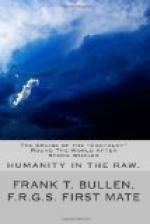There was now a big heap of work for the carpenter, so the skipper decided to run in for the Cocos or Keeling islands, in order to lay quietly and refit. We had now only three boats sound, the one smashed when poor Bamberger died being still unfinished—of course, the repairs had practically amounted to rebuilding. Therefore we kept away for this strange assemblage of reefs and islets, arriving off them early the next day.
They consist of a true “atoll,” or basin, whose rim is of coral reefs, culminating occasionally in sandy islands or cays formed by the accumulated debris washed up from the reef below, and then clothed upon with all sorts of plants by the agency of birds and waves.
These islands have lately been so fully described in many different journals, that I shall not burden the reader with any twice-told tales about them, but merely chronicle the fact that for a week we lay at anchor off one of the outlying cays, toiling continuously to get the vessel again in fighting trim.
At last the overworked carpenter and his crew got through their heavy task, and the order was given to “man the windlass.” Up came the anchor, and away we went again towards what used to be a noted haunt of the sperm whale, the Seychelle Archipelego. Before the French, whose flag flies over these islands, had with their usual short-sighted policy, clapped on prohibitive port charges, Mahe was a specially favoured place of call for the whalers. But when whale-ships find that it does not pay to visit a place, being under no compulsion as regards time, they soon find other harbours that serve their turn. We, of course, had no need to visit any port for some time to come, having made such good use of our opportunities at the Cocos.
We found whales scarce and small, so, although we cruised in this vicinity for nearly two months, six small cow cachalots were all we were able to add to our stock, representing less then two hundred barrels of oil. This was hardly good enough for Captain Slocum. Therefore, we gradually drew away from this beautiful cluster of islands, and crept across the Indian Ocean towards the Straits of Malacca. On the way, we one night encountered that strange phenomenon, a “milk” sea. It was a lovely night, with scarcely any wind, the stars trying to make up for the absence of the moon by shining with intense brightness. The water had been more phosphorescent than usual, so that every little fish left a track of light behind him, greatly disproportionate to his size. As the night wore on, the sea grew brighter and brighter, until by midnight we appeared to be sailing on an ocean of lambent flames. Every little wave that broke against the ship’s side sent up a shower of diamond-like spray, wonderfully beautiful to see, while a passing school of porpoises fairly set the sea blazing as they leaped and gambolled in its glowing waters. Looking up from sea to sky, the latter seemed quite black instead of blue, and the lustre of the stars was diminished till they only looked like points of polished steel, having quite lost for the time their radiant sparkle. In that shining flood the blackness of the ship stood out in startling contrast, and when we looked over the side our faces were strangely lit up by the brilliant glow.




